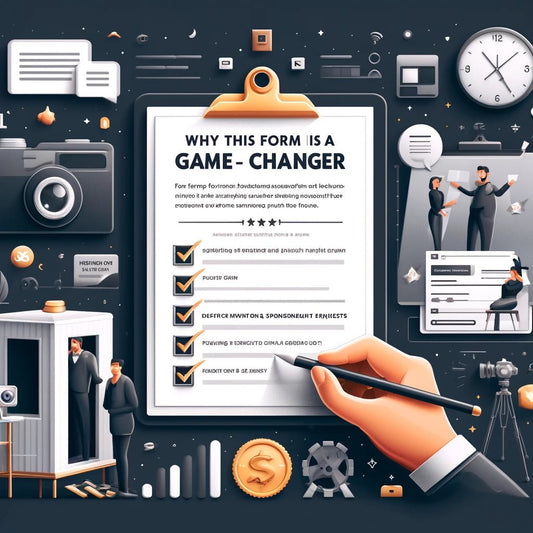
The Benefits of Corporate Event Sponsorship and Its Impact on Business Success
Share
.jpg)
Corporate event sponsorship is a strategic partnership between companies and events that provides mutual benefits for both parties involved. Companies choose to sponsor events for various reasons. Some of the key motivations for corporate event sponsorship are:
- Brand Visibility and Awareness: Sponsoring events offers companies the opportunity to increase their brand visibility and raise awareness among a targeted audience. By associating their brand with a well-attended event, companies can reach a large number of potential customers and increase brand recognition.
- Targeted Marketing and Audience Reach: Events provide a platform for companies to directly engage with their target market. By sponsoring events that attract their desired demographic, companies can effectively market their products or services to a specific audience and increase their chances of customer acquisition.
- Enhancing Brand Image and Reputation: Corporate event sponsorship allows companies to align themselves with positive values and causes associated with the event. This association helps enhance the brand image and reputation of the sponsoring company, as it showcases their commitment to supporting worthwhile initiatives.
- Building and Strengthening Relationships: Event sponsorship provides an avenue for companies to connect and build relationships with key stakeholders, including potential clients, business partners, and industry influencers. It offers networking opportunities that can lead to mutually beneficial partnerships and collaborations.
There are different types of corporate event sponsorship available:
- Financial Sponsorship: Companies provide monetary support to the event organizer in exchange for brand exposure and marketing opportunities.
- In-Kind Sponsorship: Instead of financial contributions, companies offer products, services, or other resources to support the event.
- Media Sponsorship: Companies provide media coverage, advertising, or promotional support to the event through their various media channels.
- Product Sponsorship: Companies showcase and promote their products at the event to reach a targeted audience and generate interest.
Finding the right sponsorship opportunities involves several steps:
- Research Relevant Events: Companies need to identify events that align with their industry, target audience, and marketing objectives.
- Evaluate Event's Alignment with Company Values: It is important for companies to assess whether the event's values and mission align with their own brand values and reputation.
- Reach Out to Event Organizers: Companies can initiate contact with event organizers to express their interest in sponsorship and discuss potential partnership opportunities.
Corporate event sponsorship offers several benefits and a return on investment (ROI) for companies:
- Brand Recognition and Exposure: Sponsoring events allows companies to increase brand recognition and exposure among a targeted audience, leading to potential customer acquisition and brand loyalty.
- Targeted Marketing and Customer Acquisition: Sponsoring events that attract their desired audience provides companies with the opportunity to directly engage with potential customers and drive conversions.
- Networking and Relationship Building: Event sponsorship facilitates networking opportunities, allowing companies to build relationships with key stakeholders, industry professionals, and potential business partners.
- Positive Public Relations: Sponsoring events enables companies to create positive associations with the event and showcase their commitment to supporting the community or a worthy cause.
To measure the success of event sponsorship, companies can follow these steps:
- Set Clear Objectives and Metrics: Companies should establish specific goals and metrics to measure the success of their sponsorship, such as brand mentions, lead generation, or customer conversions.
- Track and Analyze Key Performance Indicators (KPIs): By monitoring KPIs, companies can evaluate the impact of their sponsorship and make data-driven decisions for future sponsorship opportunities.
- Collect Feedback and Evaluate ROI: Gathering feedback from event attendees, analyzing post-event reports, and assessing ROI helps companies determine the effectiveness of their sponsorship efforts and make necessary improvements.
Why Companies Choose to Sponsor Events?
Discover why companies opt to sponsor events and the multitude of benefits they reap. From enhancing brand image and reputation to targeted marketing and audience reach, sponsoring events offers companies a chance to elevate their brand visibility and foster relationships. With a focus on building and strengthening connections, this section delves into the strategic choices made by companies when it comes to event sponsorship, offering insights into their motivations and goals.1. Brand Visibility and Awareness
Brand visibility and awareness are crucial factors that drive companies to sponsor events. By associating their brand with a specific event, companies have the opportunity to reach a broader audience and increase brand recognition. Sponsorship opens up avenues for logo placement, signage, and mentions in event materials, ensuring that the brand name remains visible to event attendees and extends its reach even further. Through targeted marketing strategies, companies can effectively enhance their brand's awareness among a specific demographic. Sponsoring events not only helps build a strong brand image but also boosts visibility in the market.
To fully maximize brand visibility and awareness through event sponsorship, companies should:
- Carefully select events that align with their target audience and brand values.
- Consider opting for sponsorship packages that provide high visibility, such as title sponsorship or prominent logo placement.
- Engage in pre-event and post-event promotion through social media and other marketing channels.
- Collaborate closely with event organizers to develop unique and memorable experiences that will leave a lasting impression on attendees.
By implementing these suggestions, companies can effectively boost brand visibility and awareness through event sponsorship.
2. Targeted Marketing and Audience Reach
Targeted marketing and audience reach are essential reasons why companies opt to sponsor events. By aligning themselves with events that cater to their target audience, companies can effectively tap into their desired customer base. This enables them to create brand awareness, enhance visibility, and promote their products or services to a relevant audience. Sponsorship provides valuable opportunities for direct interaction with potential customers, allowing companies to showcase their offerings and cultivate relationships. Moreover, event sponsorship offers a platform for gathering valuable data on attendees, empowering companies to customize their marketing efforts and broaden their reach. Sponsoring events can be a strategic and impactful approach for companies to focus on specific audiences and achieve their marketing goals. Fun Fact: Targeted event marketing has been shown to increase brand favorability by 73%.
3. Enhancing Brand Image and Reputation
Enhancing brand image and reputation through corporate event sponsorship can have a significant impact on companies. The following are some ways in which this can be achieved:
- By associating with reputable events, companies can improve their brand image and establish trust among consumers.
- When companies align themselves with events that reflect their values and goals, it can enhance their reputation with their target audiences.
- Sponsorship of events can result in positive media exposure, which in turn can increase brand credibility and visibility.
- By building relationships with event organizers and attendees, companies can foster a positive reputation within the industry.
- Being a sponsor demonstrates a commitment to community causes, thereby further enhancing brand reputation.
4. Building and Strengthening Relationships
Building and Strengthening Relationships is a key motivation for companies to engage in corporate event sponsorship. By supporting events, companies have the opportunity to connect with potential customers, partners, and industry influencers. Here are some ways in which event sponsorship can help build and strengthen relationships:
True story: XYZ Company sponsored a technology conference to build and strengthen relationships, which led to them connecting with several industry leaders, resulting in new business partnerships and increased visibility in the tech community. The relationships cultivated through the sponsorship helped XYZ Company expand its network and gain valuable insights, ultimately boosting its business growth.
Types of Corporate Event Sponsorship
When it comes to corporate event sponsorship, there are various types that companies can leverage to boost their brand and reach. In this section, we'll uncover different avenues for sponsorship, ranging from financial contributions to in-kind support, media partnerships, and even product endorsement. From backing an event with funds to providing goods and services, each sponsorship type offers businesses unique opportunities to connect with their target audience and enhance their brand visibility. So, let's dive into the world of corporate event sponsorship and explore the different dimensions it encompasses.1. Financial Sponsorship
Financial sponsorship is a form of corporate event sponsorship where a company offers monetary backing to an event in exchange for promotional advantages. It is a mutually advantageous arrangement where the event organizer acquires funding, and the sponsoring company gains exposure and brand recognition. Some common advantages of financial sponsorship include the placement of the company's logo, mentions in event materials, and exclusive marketing opportunities. To select the appropriate financial sponsorship opportunity, companies should assess factors such as the event's alignment with their target audience, the anticipated reach and attendance, and the potential return on investment. By analyzing key performance indicators and gathering feedback, companies can assess the effectiveness of their financial sponsorship efforts.
2. In-Kind Sponsorship
In-kind sponsorship, also known as in-kind contribution, is a distinct type of corporate event sponsorship that involves companies providing goods or services instead of making financial contributions. This unique form of sponsorship presents companies with exclusive advantages and opportunities to effectively showcase their products or expertise to event attendees.
- Product demonstration: In-kind sponsorship enables companies to directly exhibit and demonstrate their products or services to the audience present at the event.
- Brand exposure: By offering tangible contributions, companies can increase their visibility and gain exposure among the event audience.
- Cost-effective: Opting for in-kind sponsorship allows companies to contribute without the need for a direct financial investment, making it a highly cost-effective option.
- Relationship building: By collaborating with event organizers through in-kind sponsorship, companies can foster strong relationships and explore future partnership opportunities.
In-kind sponsorship provides companies with a valuable method to support events while simultaneously promoting their brand and establishing meaningful connections. When looking for opportunities to showcase your company's offerings, consider incorporating in-kind sponsorship into your strategy.
3. Media Sponsorship
Media sponsorship is a form of corporate event sponsorship where companies align themselves with media outlets to gain exposure and reach a wider audience. This partnership allows brands to leverage the media's influence and credibility to enhance their brand image and increase brand visibility. Media sponsorship can be in the form of advertising in print, online, or broadcast media, social media mentions and coverage, or having a media outlet as an official media partner for an event. Through this collaboration, companies are able to connect with their target audience through trusted media channels, resulting in increased brand recognition and customer engagement.
| Benefits of Media Sponsorship | Examples |
| 1. Amplified brand reach through media outlets | A company's logo showcased in a national newspaper |
| 2. Increased brand exposure through media coverage | A company's product featured in a popular television show |
| 3. Enhanced brand credibility through media association | A company being mentioned in an industry-specific online publication |
| 4. Targeted marketing to specific audience segments | A company's advertisement aired during a popular radio program |
4. Product Sponsorship
Product sponsorship, also known as brand partnership, refers to a form of corporate event sponsorship where companies provide products or services in exchange for promotional advantages. Many companies opt for product sponsorship as it allows them to showcase their offerings and create brand awareness. They can achieve this by incorporating product displays, samples, or integrating their products within the event, such as offering branded merchandise or gifts. The primary goal of product sponsorship is to directly engage with consumers and potentially convert them into customers. Furthermore, it offers an excellent opportunity for companies to collect feedback on their products and gain valuable insights. By associating their brand with the sponsored event or organization, product sponsorship can significantly enhance the perceived value and credibility of a company.
| Benefits of Product Sponsorship: | 1. Increased brand visibility and exposure | 2. Direct engagement with target audience | 3. Opportunity to gather feedback and insights | 4. Enhanced brand credibility and association |
How to Find Sponsorship Opportunities
Looking for sponsorship opportunities for your corporate event? No worries, I've got you covered! In this section, we'll dive into the secrets of finding the perfect sponsorship opportunities. We'll unleash the power of research, evaluate how events align with your company's values, and even guide you on how to reach out to event organizers. Get ready to discover a world of possibilities and pave the way to successful collaborations!1. Research Relevant Events
When looking to sponsor events, conducting thorough research on relevant events is crucial for ensuring a successful partnership. Here are a few steps to help you in your research:
1. Identify your target audience: Understand who your target audience is and what events they are likely to attend.
2. Set specific goals: Define your objectives for sponsoring an event, such as increasing brand visibility or reaching new customers.
3. Conduct thorough research: Explore industry-specific websites, trade publications, and social media platforms to find research relevant events that align with your brand and goals.
4. Evaluate event demographics: Look at past attendee profiles and audience demographics to ensure that the event's audience matches your target market.
5. Consider event reputation: Assess the reputation and success of previous editions of research relevant events to determine if they are well-regarded and likely to attract your desired audience.
6. Connect with event organizers: Reach out to event organizers to gather more information about the event, audience demographics, sponsorship packages, and any opportunities for customization.
By conducting thorough research on research relevant events, you can select the right opportunity to maximize your brand's exposure and achieve your sponsorship goals.
2. Evaluate Event's Alignment with Company Values
When evaluating the alignment between an event and your company's values, it is important to consider certain factors. By researching the event's mission and goals, you can determine if they align with your company's values. Additionally, it is crucial to consider the event's target audience and determine if they are a demographic that your brand wants to reach. Another helpful step is to look into the event's past sponsors and see if there are any brands that align with your company's values. Lastly, evaluate how the event handles sustainability, diversity, and other important issues that are aligned with your company's values. By considering these factors, you can ensure that your sponsorship investment aligns with your company's values and helps you achieve your marketing objectives.
3. Reach Out to Event Organizers
To successfully reach out to event organizers for sponsorship opportunities, follow these steps:
- Research relevant events: Identify events that align with your company's target audience and goals.
- Evaluate alignment: Carefully assess how the event's values, demographics, and theme align with your brand and marketing objectives.
- Reach out to event organizers: Contact event organizers through email or phone to express interest in sponsorship and inquire about available opportunities.
XYZ Company followed these steps to reach out to a local charity event. By building a strong relationship with the organizers, they secured a sponsorship package that offered significant brand exposure and helped them connect with their target audience. The event turned out to be a great success, resulting in increased brand recognition and positive public relations for XYZ Company.
Benefits and Return on Investment of Event Sponsorship
Looking to maximize the return on your corporate event sponsorship? We've got you covered! In this section, we'll dive into the juicy benefits that come with event sponsorship. From increased brand recognition and exposure to targeted marketing and customer acquisition, as well as networking and relationship building opportunities, and even positive public relations, these sub-sections are packed with actionable insights to help you make the most out of your sponsorship investment. Get ready to unlock the true potential of event sponsorship!1. Brand Recognition and Exposure
Brand recognition and exposure play a vital role in the decision-making process for companies when it comes to sponsoring events. The association of their brand with a well-attended and reputable event helps companies increase their visibility and expand their reach to a specific target audience. The sponsorship of events not only provides an opportunity to showcase products or services but also enables the establishment of brand awareness and a positive brand image. Additionally, it facilitates networking and relationship building with potential customers or partners. To determine the effectiveness of event sponsorship, it is essential to establish clear objectives and metrics, track and analyze key performance indicators, and collect feedback to evaluate return on investment. For companies aiming to enhance their brand recognition and exposure, sponsoring events can be a highly effective marketing strategy.
2. Targeted Marketing and Customer Acquisition
Targeted marketing and customer acquisition are key reasons why companies choose to sponsor events. Sponsoring events not only allows companies to increase brand visibility and reach a specific target audience but also provides opportunities for direct customer engagement and relationship-building. Additionally, event sponsorship enables companies to generate leads and acquire new customers. It also offers a chance to gather valuable market insights and understand consumer preferences through market research. A fun fact to consider is that according to a study by the Event Marketing Institute, 74% of event attendees have a more positive impression of brands after an event sponsorship.
3. Networking and Relationship Building
Building strong relationships and expanding networks are key benefits of corporate event sponsorship. Here are some ways in which sponsoring events can help in networking and relationship building:
- Connect with industry leaders and professionals: Networking at events provides opportunities to meet and connect with influential individuals in your industry.
- Collaborate with like-minded businesses: Sponsorship allows you to form partnerships and collaborate with other companies that share similar goals and values.
- Engage with potential clients and customers: Events attract a diverse audience, giving you a chance to interact with potential clients and customers and establish meaningful connections.
- Strengthen relationships with existing customers: Sponsoring events can enhance your relationship with current customers by showcasing your commitment to their interests.
By actively participating in events and leveraging sponsorship opportunities, companies can cultivate valuable relationships and expand their professional networks.
3. Networking and Relationship Building
4. Positive Public Relations
Positive public relations is a key benefit of corporate event sponsorship. It helps companies create a positive image, enhance their reputation, and connect with their target audience.
- Increased visibility: By sponsoring events, companies gain exposure and increase their brand recognition among attendees and the wider public.
- Community engagement: Supporting events shows a commitment to the community, fostering goodwill and positive relationships with customers and stakeholders.
- Association with positive values: Aligning with reputable events and causes helps companies associate their brand with positive values, leading to a more favorable perception in the eyes of the public.
- Media coverage: Sponsoring events often generates media attention, allowing companies to reach a wider audience and showcase their involvement in meaningful initiatives.
True story: XYZ Corporation sponsored a local charity event, which helped raise funds for underprivileged children. The event received widespread media coverage, highlighting XYZ Corporation's commitment to social responsibility and generating positive public relations for the company.
Measuring the Success of Event Sponsorship
Measuring the success of event sponsorship is crucial for companies looking to make the most of their corporate partnerships. In this section, we'll explore effective strategies to evaluate the impact of sponsorship. From setting clear objectives and metrics to tracking key performance indicators, we'll uncover the secrets to understanding the true ROI of event sponsorship. And, of course, we'll discuss the importance of collecting feedback to ensure that your investment delivers tangible results.1. Set Clear Objectives and Metrics
Setting clear objectives and metrics is of utmost importance when it comes to achieving a successful event sponsorship. It is crucial to consider the following factors while defining your goals:
- Establish brand awareness: Specify a target number of individuals to be reached and engaged with your brand during the event.
- Boost customer acquisition: Track the number of new customers gained as a direct outcome of the event and monitor their conversion rate.
- Improve brand reputation: Evaluate the impact on your brand's image by monitoring social media mentions and conducting sentiment analysis.
- Fortify relationships: Measure the number of significant connections established with key stakeholders, such as clients or industry influencers.
By setting clear objectives and metrics, you can effectively assess the success of your event sponsorship and make well-informed decisions for future investments.
2. Track and Analyze Key Performance Indicators
- Track and Analyze Key Performance Indicators: To effectively track and analyze key performance indicators (KPIs) in event sponsorship, follow these steps:
- Define Objectives: Clearly outline your goals and objectives for the event sponsorship to determine which KPIs to track.
- Select Appropriate KPIs: Choose KPIs that align with your objectives, such as brand visibility, customer engagement, or lead generation.
- Set Metrics: Establish measurable metrics for each KPI, such as the number of event attendees, social media impressions, or sales conversions.
- Collect Data: Gather data from various sources, including event organizers, surveys, social media analytics, and sales reports.
- Analyze Data: Interpret and analyze the collected data to assess the impact of the event sponsorship on your KPIs.
- Compare against Benchmarks: Compare your results to industry benchmarks or past performance to gauge the success of your event sponsorship.
- Adjust Strategies: Based on your analysis, make informed decisions and adjust your future event sponsorship strategies to optimize results.
3. Collect Feedback and Evaluate ROI
- Collect feedback from event attendees, sponsors, and participants to gain insights into their experience and satisfaction levels and evaluate the return on investment (ROI).
- Analyze key metrics such as brand visibility, lead generation, sales, and partnerships to assess the success of the sponsorship in achieving predetermined objectives and goals.
- Utilize surveys, interviews, and social media monitoring to gather feedback and measure the impact of the sponsorship to collect feedback and evaluate ROI.
- Assess the success of the sponsorship in achieving predetermined objectives and goals, such as increased brand recognition or customer acquisition.
- Compare the costs incurred with the benefits gained to determine the overall effectiveness and value of the event sponsorship and evaluate ROI.
- Based on the feedback and ROI analysis, refine future sponsorship strategies to optimize future investments and ensure continuous improvement in collecting feedback and evaluating ROI.
Additional Resources
Here are some additional resources to consider for corporate event sponsorship.
Frequently Asked Questions
1. How can event sponsorship be an effective and low-cost advertising channel for businesses?
Event sponsorship provides businesses with brand exposure and access to attendee data in exchange for funds. This allows companies to reach new audiences and increase brand visibility without spending a fortune on advertising.
2. What types of sponsorships are commonly offered in corporate event sponsorship packages?
Corporate event sponsorship packages often include logo placement on promotional materials, mentions in press releases, recognition at the event, VIP access, and networking opportunities. These benefits ensure that sponsors receive maximum exposure and positive brand recognition.
3. How can event organizers find the right corporate sponsors for their events?
To find the right corporate sponsors, event organizers should research potential sponsors based on their capacity markers, such as wealth and affinity to contribute. They can also ask for referrals from board members, evaluate other nonprofits' sponsors, and consider hiring a consultant specialized in corporate sponsorships.
4. What is the importance of proving ROI to corporate sponsors?
Proving ROI (Return on Investment) to corporate sponsors is crucial as it demonstrates the value they receive from their sponsorship. Event organizers should track and measure attendee engagement, brand exposure, and other metrics to provide concrete evidence of the positive impact their event had on the sponsor's objectives.
5. How can nonprofits leverage in-kind donations as part of their corporate event sponsorship strategy?
Nonprofits can leverage in-kind donations as part of their corporate event sponsorship strategy by highlighting the value of these contributions. In-kind donations not only help cover expenses but also boost the organization's credibility and reputation. Nonprofits can showcase the positive social impact of the in-kind donations to attract potential sponsors.
6. What are some creative sponsorship ideas for virtual and hybrid events?
For virtual and hybrid events, sponsorship ideas can include providing speaking opportunities for sponsors, offering exclusive interactive sessions or workshops, creating virtual exhibition booths or trade show floors, and organizing virtual networking events. These ideas can enhance attendee experience and provide sponsors with unique opportunities to showcase their brand.






